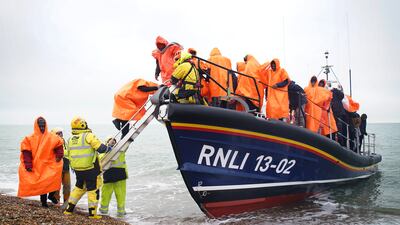In an effort to reduce the amount of money spent on hotel accommodation for migrants, the UK is considering the use of military camps as an alternative housing option.
It comes as politicians prepare to debate the government's new Illegal Migration Bill which will prevent people arriving on small boats from seeking asylum.
The government has been spending about £6 million ($7.33 million) a day on hotel accommodation and the current asylum system is costing £3 billion a year.
The latest accommodation plan replaces previous suggestions of using holiday camps and student halls of residence, according to Sky News.
Another option raised had also been to use decommissioned ferries.
The government has repeatedly signalled it wants to end the use of hotels as asylum seeker accommodation.
“We have always been upfront about the unprecedented pressure being placed on our asylum system, brought about by a significant increase in dangerous and illegal journeys into the country,” a Home Office representative said.
“We continue to work across government and with local authorities to identify a range of accommodation options.”
It has also faced criticism after it was revealed hundreds of unaccompanied children who have been placed in hotels have disappeared amid fears they may have been taken by criminal gangs.
Prime Minister Rishi Sunak has made stopping boat arrivals a key priority after the number of migrants arriving on the English south coast soared to 45,000 last year, up from about 300 in 2018.
Under the new bill, which was announced earlier this month, asylum seekers arriving through unauthorised means would be detained without bail or judicial review for 28 days before being “swiftly removed” to their home country or a “safe third country” such as Rwanda.
The bill has been has been widely criticised, with rights groups and the UN refugee agency warning that the proposed legislation risks breaching the UK’s international obligations.
Some Conservative Tory MPs have signalled that it does not go far enough, with some calling for ministers to take the UK out of the European Convention on Human Rights (ECHR) to drive through tighter border controls.
Others on the liberal wing of the party want to see Prime Minister Rishi Sunak commit to establishing safe routes via which asylum seekers can come to Britain.
MP Danny Kruger, who is seeking tighter controls, said he wanted provisions in the bill to “operate notwithstanding any orders of the [EU's] Strasbourg court or any other international body”.
The European Court last year granted an injunction, via its Rule 39, that effectively grounded a flight sending asylum seekers from the UK to Rwanda.
“We are looking for commitments from the government to take seriously the amendments we are putting down that would strengthen the Bill,” he told BBC Radio 4’s Today programme on Monday.
“We are very supportive of what they are doing — there is no rebellion here — but we do want to make sure we get those commitments.
“So we are waiting to hear what they say at the despatch box and I am hopeful that we can get the engagement that we want so that we can tighten the bill.”


